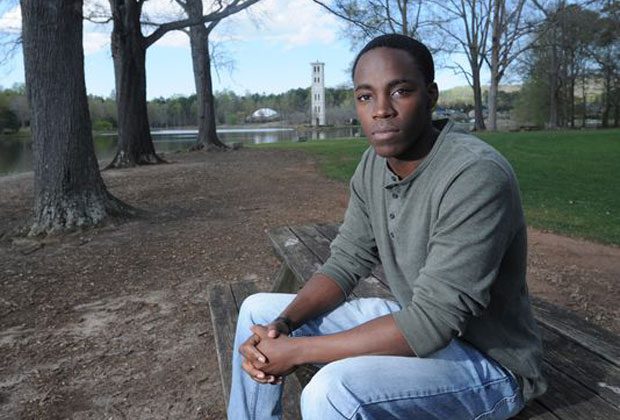For six weeks, we ran . . .

Jonathan Kubakundimana ’16 doesn’t remember it, but it still keeps him up at night wondering, “what if?”
What if his parents made the wrong turn down a road? What if they went into the wrong church or school to seek shelter? What if they had made a fatal mistake?
The son of a Tutsi mother and a Hutu father, Kubakundimana was just six months old on April 7, 1994, when the Rwandan genocide began that wiped out nearly all of his mother’s family. He shared his experience in front of a packed Patrick Lecture Hall Monday, as part of commemorations of the 20th anniversary of the genocide worldwide. The event, part of the university’s Cultural Life Program, was themed, “Remembering the Rwandan Genocide: 20 Years in the Eyes of a Survivor,” and included remarks by history professor Erik Ching.
It was a time when people were taught that the Tutsi ethnic group was subhuman, that Tutsis were “inyenzi,” or cockroaches, that needed to be exterminated, Kubakundimana said. More than 800,000 people were brutally killed in about three months with machetes, nail-studded clubs, spears, and hammers.
“For six weeks, we ran in Rwanda,” barely escaping death each day in his mother’s arms, Kubakundimana said.
They finally made it to Nairobi, Kenya. With the help of a friend, the family was able to fly to Edinburgh, Scotland, to gain asylum as political refugees. It was there that Kubakundimana has his earliest memories and where he began to ask his parents questions about their family heritage and about the genocide.
“Other kids had grandparents, cousins, uncles and aunts and so I asked about mine,” he said. “It was something I grew up with that haunted me from as early as I can remember,” he said.
The family returned to Rwanda in the late 1990s, wanting to be part of the rebuilding of their homeland. One night, fireworks on a national holiday started Kubakundimana’s mother crying, shaking and screaming, reminding her of perpetual gunshots during the genocide.
It’s something that’s still very real for Kubakundimana, a political science major at Furman. “For the longest time I asked myself: Why me? Why did I survive?” he said. “It’s still a question that keeps me up at night.”
Today, Rwanda is a much different place and it has a bright future, Kubakundimana said. So he has been thinking about another question: what to do with the life he has been given.
“It is my duty as a survivor, as a Rwandan, to my family, to tell the world our story, the story of Rwanda,” he said. “I may not know the reason I survived but I will do my best to earn the life I’ve been given in remembrance and in honor of all those that died.”
Watch the Greenville Online interview with Jonathan Kubakundimana.
(Photo: Heidi Heilbrunn, Greenville Online Staff Photographer)